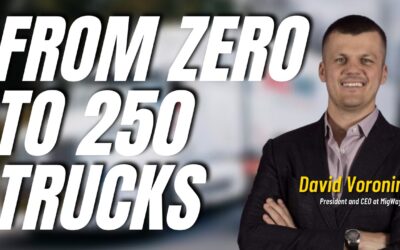With the 2021 tax season in the rearview window, most Americans can breathe a sigh of relief However, owner-operators know that the end of one tax season is the beginning of the next. A proper understanding of tax rules for truck drivers prepares owner-operators with the tools they need to successfully navigate the annual tax season amidst varying tax law changes.
On March 31, 2022, the U.S. Congress introduced bipartisan legislation making tax preparation for owner-operators something to look forward to TruckerNews.com reported, “The bipartisan Strengthening Supply Chains Through Truck Driver Incentives Act would provide a short-term, fast, and straightforward incentive to attract and retain new drivers. The Spanberger-Gallagher bill would create a two-year refundable tax credit of up to $7,500 for truck drivers holding a valid Class A commercial driver’s license who drive at least 1,900 hours in the year. Additionally, it would create new incentives for Americans to enter registered trucking apprenticeships.” However, owner-operators must learn sound financial advice while growing their business to claim this tax credit. Consider the following concepts about trucking business taxes to do just that.
Types of Taxes
Before addressing owner-operator tax write-offs, business owners need to consider the type of taxes they are responsible for paying.
- Self-Employment Taxes – When working for a corporation, the business owner removes a percentage to cover their liability toward social security and Medicare. According to the IRS, the self-employed owner-operator taxes are separated into 12.4% and 2.9% rates which come to 15.3%.
- Income Taxes – Company employees also have state and federal income taxes automatically removed from their paycheck according to their submitted W-2s. Owner-operators are independently responsible for estimating these to pay quarterly and annually. Tax-brackets.org is an excellent resource for those growing their business, starting with one truck. The website provides tax brackets for each state and across multiple business bases.
Estimated Tax Payments
So how much tax does a truck driver need to pay? While the actual amount depends on the individual business income, it can be estimated anywhere between20-30% of the total net income. Unlike other professions that pay an annual tax each April, self-employed truckers are required to pay quarterly income tax.
Some back-office partners even recommend that owner-operators pay their estimated taxes monthly to minimize the tax research required at the end of each quarter. When starting a trucking company, some owner-operators fail to do this correctly and are penalized for underpayment.
Deductions and Recordkeeping
Owner operators would probably benefit from automated record keeping to make sure they paid the correct tax each quarter. The responsibility for adequately filing all documents for tax deductions is often overwhelming. Fortunately, there are a few easy methods that owner operators can utilize.
A few year-round record-keeping methods include:
- Automating accounts receivable to ensure they get paid quickly and easily to minimize lost payment and load information across extended pay wait times.
- Use a separate business credit card to easily find expenses related to tax deductions for truck driver owner-operators.
- Make sure to keep organized records of all documents for each load to make rfiling taxes easier.
- Download all virtual data from logging systems monthly or quarterly to prevent valuable data loss.
Typical Tax Deductions for Owner-Operators
Owner-operator tax write-offs will minimize the amount owed to the IRS during tax season. The entire concept of the write-off is to include anything necessary to conduct business properly. Some of these owner-operator tax write-offs include:
- Accounting – Accountant Fees, Factoring Provider Charges, Bank Charges, Commissions and Sales Expenses, Shipper and Freight Broker Credit Checks, and Interest Paid on Business Loans
-
- Load Specific Costs – Contract Labor, Fuel Costs, Per Diem, Detention, Demurrage, and other related fees.
- Marketing and Networking – Advertising, Load Board Memberships, Association Dues, Industry Subscriptions
- Job Requirements – Insurance Premiums, Benefits, Retirement Fund, Continuing Education, Permits and Licensing, TMS, Medical Exams, Business Phone, Business Computer, Laundry, Boots, and Gloves
- Vehicle Costs – Start-Up Costs, Maintenance, Repairs, Tools, Depreciable Property (Trucks/Trailers), Accessories
While these are standard tax deductions for truck driver owner-operators, there may be many others specific to the truck driver or tax requirements that year. Maintaining health insurance was a considerable concern in this area until owner operator tax deductions 2019. Ultimately, any ordinary and necessary purchases to accomplish the job may be owner-operator tax write-offs with receipts.
What Are Non-Deductible Truck Driver Expenses?
drivers save time and money by knowingwhat they don’t need to keep records of for a tax break. Fuel costs forcommutes between home and work are non-deductible. Any personal travel expenses or money spent on meals also do not qualify. Also, truck drivers need to make sure that they do not write off any costs that were previously reimbursed. any travel expenses
Per Diem Expenses
When filing truck driver taxes, operators have two choices for meal expenses. An owner-operator tax calculator covers per diem tax as the average cost of meals and incidental expenses when a driver works away from home. In October 2021, the IRS shared that the per diem rate increased to $69 per day when driving within the continental United States and $74 outside. These rates are valid until September 30, 2022, after which the IRS will publish their new per diem dataset..
The per diem owner-operator tax write-off assumes that a driver will spend this much per day on the road (or ¾ of it for any partial days on the road). And it directly impacts self-employment truck income taxes. . Many owner-operators choose to utilize the federal government’s amount by simply submitting e-logs at the end of the year, some owner-operators decide to keep track of all of their actual expenses and submit those themselves as a write-off. In the end, this choice is entirely up to the individual filing their truck driver taxes.
Tax Myths vs. Reality
There are many preconceived notions about truckers’ income tax. Among the myths is whether deadhead miles count towards an owner-operator tax write-offs. Since drivers are only taxed based on their income, these miles and any necessary time off are already deducted. Another common myth is that hiring a freight factoring company or tax consultant is not worth the cost.
However, owner-operators who employ an expert in the transportation financial field learn from the experience of others without any personal losses. In addition, how a trucker finds loads to haul does impact their taxes. Paying for a subscription to a load board or any other networking opportunity to access approved brokers is tax-deductible.
As mentioned above, depreciating property can count as owner-operator tax write-offs. While this would fall into the trucking industry’s most common item of the truck itself, this is not the only consideration. It could also pertain to a trailer or any specialized equipment required to use f the truck, such as a refrigeration system for a reefer. These owner-operator truck depreciation items fall under the section 179 deduction, which has rules that can vary year to year for qualifying business purchases.
Traditionally, a business purchase deduction is useful across the approximate lifespan of the vehicle. However, under section 179, business owners can deduct the total price within one year. Due to the potential impact on a truckers’ income tax, owner-operators need to research IRS.gov or consult with a tax professional for more information on depreciating property.
Lease vs. Purchase
As owner-operators explore the need for new equipment for themselves or to grow a small trucking fleet, they will have to choose between leasing and purchasing. Both options prevent different owner operators with different types of taxation. Lease operator taxes will include the entire amount of each month’s payment for the duration of the lease. According to the depreciation schedule of vehicles, a vehicle owner will experience higher deductions within the first two years, with a slight depreciation left by the fourth year. The purchaser will begin experiencing tax benefits through the delay, not elimination, of tax payments on the item.
Therefore, owner-operators who prefer to trade in equipment every 2-3 years often opt for the leasing route, which can add up to the erosion of depreciation that enables the opportunity to buy an expensive truck with depreciation to show for it. Meanwhile, owner-operators who prefer to keep their equipment for the long haul (pun intended) tend to purchase their equipment outright. Regardless, drivers should consult a tax professional for guidance for their specific situation to get the best owner-operator tax write-offs.
Minimizing Taxes Tips
Ultimately when searching how do owner-operators file taxes, a business owner is just trying to figure out how to minimize their tax liability and keep their business profitable.Some ways to do that include:
- Hire an owner-operator specialized tax professional. Although a small business tax professional is likely familiar with the section 179 deduction items, the truckers’ income tax filing experience will be smoother with an independently operating carrier specialized tax professional.
- Invest in a retirement fund. Owner-operators can minimize their tax liability by contributing toward an IRA, SEP, or 401(K) tax-free and tax-exempt until the money gets drawn out.
- Keep track of business-related miles. Although all miles driven behind the truck wheel are tax-deductible, owner-operators who keep track of their personal vehicle’s miles when driving to the bank, truck show, or any other business function can also deduct that mileage.
- Claim tuition tax credits. Whether an owner-operator has enrolled themself in hazmat training or signed their grandchild up for kindergarten, tuition tax credits are an excellent way to increased owner-operator tax write-offs.
- Track diagnoses. Doctor prescribed items or activities can often be tax-deductible, including gym memberships.
What to Do When There Is an IRS Audit
When reporting on a new finding that lower-income returns are more likely to be audited, CBS News reported that “Whatever your income level, the odds of getting audited has declined. The audit rate slipped to 0.2% in 2020 due to the pandemic.” Although these figures are low, the IRS audit remains the fear of many. he IRS has three years to challenge a tax filing, i Unusual tax write-offs sometimes trigger IRS audits. Others are initiated as a random selection process to ensure compliance with tax filing rules.
If audited, the best policy is to remain open, honest, and cooperative throughout the process If a tax professional is involved, drivers should contact them immediately to ensure they respond similarly to expedite the auditing process.
Owner Operator Tax FAQs
Filling out the forms for independent contractor truck driver taxes can be exhausting and confusing. Here are some frequently asked questions to cover the most common questions.
-
- How do I keep track of my estimated quarterly tax payments when shippers take advantage of extended pay windows? Although traditional payment windows can extend 90 days, the trucker payment evolution has shippers paying truckers faster through innovative options such as invoice factoring.
- Can my truck dog expenses qualify as owner-operator tax write-offs? Any truck dog that functions as a guard dog can be eligible for deductible expenses since they preserve the ability to get the job done.
- Where does fuel tax fall among owner-operator tax write-offs? Because fuel tax is considered part of the fuel expense to accomplish each job, fuel tax can be considered a write-off.
Get Financially Healthy Utilizing A Driver Experience-Focused Finance Partner
Budgeting for quarterly tax payments can be tricky. Maintaining regular cash flow enables truck drivers to build their business while still fulfilling all tax obligations without hyper-focusing on owner-operator tax write-offs. With freight factoring, factoring providers purchase the rights to an invoice from an owner-operator for a fee.
With BasicBlock, payday is always right around the corner. With instant cash and the removal of invoice follow-through responsibility, owner-operators are free to focus on the next load. To partner with a company that provides transparency and real customer support to its clients, contact BasicBlock today to get your money moving.







0 Comments